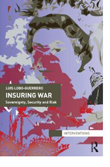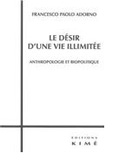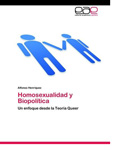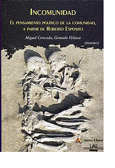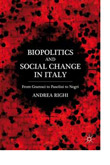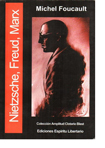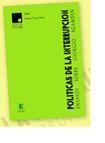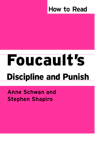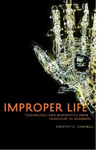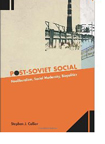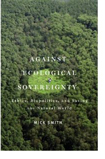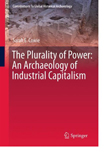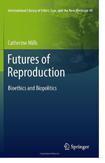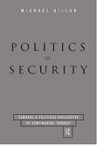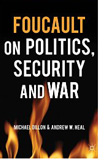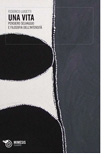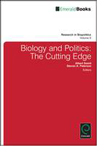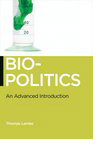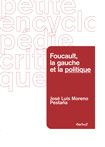Este texto, desconocido hasta noviembre de 2011, se suma a ciertas publicaciones—como Dichos y escritos, de 1995, o losSeminarios, desde 1997 hasta hoy— que han renovado del todo la comprensión de los libros de Michel Foucault (1926-1984). En 1968, tan decisivo en el pensamiento europeo, el crítico Claude Bonnefoy grabó sus palabras para hacer un libro muy […]
Books
A book (with reviews) for this site.
Insuring War. Sovereignty, Security and Risk
Los seguros son un instrumento central de la guerra en el período moderno, aun cuando hallan sido ignorados hasta ahora. Ya desde el siglo dieciocho, la interacción entre los gobiernos y los aseguradores (o las compañías de seguros) en los países occidentales se ha materializado en forma de esquemas de riesgos de guerra que han […]
Insuring War. Sovereignty, Security and Risk
Insurance is a central, if until now ignored, instrument of war in the modern period. Ever since the eighteenth century, interaction between governments and insurers in Western countries has materialised in the form of war risk schemes that have contributed to the waging of war and the preservation of peace. The operation of those schemes […]
Le désir d´une vie illimitée: anthropologe et biopolitique
Se esta volviendo cada vez más claro que el progreso tecnológico pronto nos hará capaces de modificar la naturaleza humana según nuestro deseo. La meta de realizar el sueño de la eterna juventud, libre de enfermedades y de la muerte, está venciendo sus últimos obstáculos. La posibilidad de cambiar la naturaleza humana ha devenido más […]
Le désir d´une vie illimitée: anthropologe et biopolitique
It is becoming even clearer that technological progress will soon make us capable of modifying human nature at our own will. The goal of making the dream of eternal youth free of sickness and of death is defeating its last obstacles. The possibility of changing human nature has become more acceptable both by the incapacity […]
Homosexualidad y biopolítica: Un enfoque desde la teoría queer
Nuestra hipótesis de trabajo consiste en indicar que las uniones de personas del mismo sexo son mecanismos de cierre, mediante la cita del código heterosexual, hacia formas divergentes de construir familia y relaciones de afecto. Esto nos obliga a separar la investigación en una parte relativa a los problemas éticos que la homosexualidad plantea, y […]
Incomunidad. El pensamiento político de la comunidad, a partir de Roberto Esposito
Sin el más mínimo asomo de nostalgia, a pesar de la ruina de las plasmaciones de lo común repartidas a izquierda y a derecha que poblaron el siglo XX, el pensamiento de la comunidad, como un fantasma obstinado, inquieta de nuevo a los filósofos y los sacude con fuerza. Hoy, cuando aquellas experiencias se han puesto […]
Biopolitics and Social Change in Italy. From Gramsci to Pasolini to Negri
El estudio sobre cómo la vida puede ser controlada, sustentada y manipulada se ha convertido en un asunto científico y politico de maxima urgencia en nuestra sociedad. Cada disciplina aborda su dimensión biopolítica con sus herramientas y programa; sin embargo, ignoran cómo el trabajo, al correr del tiempo, ha producido cruciales transformaciones en la manipulación […]
La vie inséparée: vie et sujet au temps de la biopolitique
Entre 1976 et 1982, Michel Foucault multiplie les hypothèses et les remaniements, ainsi que les considérations rétrospectives concernant sa méthode. C’est au cours de cette période qu’il élabore la notion de biopouvoir, indiquant le moment où, autour du XVIIIe siècle, la vie – celle des individus et celle des populations – entre comme telle dans […]
Biopolitics and Social Change in Italy. From Gramsci to Pasolini to Negri
The study of how life can be controlled, supported, and manipulated has become the most urgent scientific and political task of our society. Each discipline approaches this biopolitical dimension with its tools and agenda; however they ignore how labor over time has materially produced crucial transformations in the manipulation of life. By placing the social […]
Nietzsche, Freud, Marx
CAPÍTULO 1: EL PROBLEMA DEL PODER Franz Ewald, Revista Eco (Bogotá, Colombia), marzo de 1978, Nº 197. CAPITULO 2: ARQUEOLOGÍA DE LA LECTURA Y EL SUJETORuben Tani, Licenciado en Filosofía y Letras. Es profesor en el Departamento de Teoría del Lenguaje y Lingüística General, profesor en el Instituto de Profesores Artigas de “Lingüística” para Idioma Español y profesor […]
Il governo dell’Ethos. La produzione politica dell’agire económico
La ragione economica permea profondamente le pratiche di governo della modernità e ne misura l’efficacia sia attraverso il grado di arricchimento – vero o presunto – che esse producono nella società, sia mediante il livello di adesione all’ethos economico che esse ottengono dagli individui. Questo libro mette a fuoco non soltanto le evoluzioni dell’esercizio del […]
Políticas de la interrupción. Ensayos sobre Giorgio Agamben
Intempestivamente, Nietzsche enseñaba que la pregunta filosófica más radical es aquella que ha volcado su pasión al oscuro ámbito de la vida. En este sentido, quizás sea posible decir que la escena filosófica contemporánea no sea otra cosa más que una continua experimentación que busca modos de tocar la vida, en tanto la deriva posthistórica […]
Foucault
Les ouvrages de Foucault ont tous été ressentis comme des provocations: Histoire de la folie a heurté la bonne conscience des psychiatres, Les mots et les choses ont soulevé la grande polémique du structuralisme au milieu des années 1960, Surveiller et punir a scandalisé les milieux professionnels de la justice, et son Histoire de la sexualité enfin (tomes II et III) a […]
How to Read Foucault’s Discipline and Punish
Michel Foucault’s Discipline and Punish is one of the best-selling works of critical theory and a key text on many undergraduate courses. However, it is a long, difficult text which makes Anne Schwan and Stephen Shapiro’s excellent step-by-step reading guide a welcome addition to the How to Read Theory series.Undergraduates across a wide range of […]
Improper Life: Technology and Biopolitics from Heidegger to Agamben (Posthumanities)
Has biopolitics actually become thanatopolitics, a field of study obsessed with death? Is there something about the nature of biopolitical thought today that makes it impossible to deploy affirmatively? If this is true, what can life-minded thinkers put forward as the merits of biopolitical reflection? These questions drive Improper Life, Timothy C. Campbell’s dexterous inquiry-as-intervention.Campbell argues […]
Post-Soviet Social: Neoliberalism, Social Modernity, Biopolitics
The Soviet Union created a unique form of urban modernity, developing institutions of social provisioning for hundreds of millions of people in small and medium-sized industrial cities spread across a vast territory. After the collapse of socialism these institutions were profoundly shaken–casualties, in the eyes of many observers, of market-oriented reforms associated with neoliberalism and […]
Against Ecological Sovereignty: Ethics, Biopolitics, and Saving the Natural World (Posthumanities)
Against Ecological Sovereignty is a passionate defense of radical ecology that speaks directly to current debates concerning the nature, and dangers, of sovereign power. Engaging the work of Bataille, Arendt, Levinas, Nancy, and Agamben, among others, Mick Smith reconnects the political critique of sovereign power with ecological considerations, arguing that ethical and political responsibilities for the […]
The Plurality of Power: An Archaeology of Industrial Capitalism
How do people experience power within capitalist societies? Research presented here explicitly addresses the notion of pluralistic power, which encompasses both productive and oppressive forms of power and acknowledges that nuanced and multifaceted power relations can exist in combination with binary dynamics such as domination and resistance. This volume addresses growing interests in linking past […]
Futures of Reproduction: Bioethics and Biopolitics
Issues in reproductive ethics, such as the capacity of parents to choose children, present challenges to philosophical ideas of freedom, responsibility and harm. This book responds to these challenges by proposing a new framework for thinking about the ethics of reproduction that emphasizes the ways that social norms affect decisions about who is born. The […]
Politics of Security
Este volumen proporciona una introducción a la Biopolítica de seguridad en el siglo XXI, escrito por uno de los principales académicos en el campo y miembro de nuestra red. Será publicado en agosto de este año por la Editorial Routledge.
Politics of Security
This volume provides an introduction to the biopolitics of security in the 21st century, written by one of the leading scholars in the field and member of our network.
Beyond Biopolitics: Theory, Violence, and Horror in World Politics (Interventions)
Beyond Biopolitics exposes the conceptual limits of critical biopolitical approaches to violence, war, and terror in the post-9/11-War on Terror era.This volume shows that such popular international political theories rely upon frames of representation that leave out of focus a series of extreme forms of gruesome violence that have no concern for the preservation of […]
Foucault on Politics, Security and War
Foucault on Politics, Security and War interrogates Foucault’s controversial genealogy of modern biopolitics. These essays situate Foucault’s arguments, clarify the correlation of sovereign and bio-power and examine the relation of bios, nomos and race in relation to modern war.
Una vita. Pensiero selvaggio e filosofia dell’ intensità
¿Cuál es el legado del pensamiento de Gilles Deleuze? ¿Es posible separar su vitalismo trascendental del naturalismo de Henri Bergson y Friedrich Nietzsche? Mediante un diálogo “intenso” con estos autores, la vanguardia histórica, la biopolítica y el arte contemporáneo, el volumen introduce la confrontación entre la vida “animal” y una filosofía de la intensidad sostenida […]
Una vita. Pensiero selvaggio e filosofia dell’ intensità
What is the legacy of Gilles Deleuze’s thought? Is it possible to separate his transcendental vitalism from the naturalist vitalism of Henri Bergson and Friedrich Nietzsche? Through a dialogue with these authors and a discussion of biopolitics, the historical Avantgardes and contemporary art, the book describes the contest between a “wild” thought of life and […]
Biology and Politics: The Cutting Edge
This volume examines cutting edge research in the study of biology and politics. Following an introduction from the editors it is divided into two main sections. The first part of the book explores the linkage between evolution, genetics and politics with initial chapters on abandoned baby legislation, a model of action and norms, and the […]
Biopolitics: An Advanced Introduction
Las características biológicas de los seres humanos son medidas y observadas, y ahora se entienden de una manera que nunca antes se creyó posible, la definición de normas, el establecimiento de reglas, y la determinación de los valores medios de la vida humana. Si bien la noción de “biopolítica” se ha relacionado con todo, desde la toma de biopolítica, explorando su relevancia en debates teóricos contemporáneos, proporcionando un manual necesario sobre ésta área de estudio.
Biopolitics: An Advanced Introduction
The biological features of human beings are now measured, observed, and understood in ways never before thought possible, defining norms, establishing standards, and determining average values of human life. While the notion of “biopolitics” has been linked to everything from rational decision-making and the democratic organization of social life to eugenics and racism, Thomas Lemke […]
Foucault, la gauche et la politique
Michel Foucault se ha convertido en una filosofía política central en general y en gran parte de la izquierda en particular. A menudo se destacan sus conceptos, análisis, su estatura intelectual, su modelo de militante, etc. Su obra, sin embargo, pasó por distintas fases y su actitud política estaba lejos de ser estable. Este libro ofrece una introducción al filósofo político de los tres puntos principales: su trayectoria social, el contenido político de su obra y el contexto intelectual en el que se adapta y trabaja.



